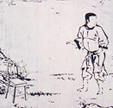Hunting Witches with Ayn Rand
In 2009,
after the election of Barack Obama, Paul Ryan reiterated his great admiration
for Ayn Rand, the high priestess of greed.
According to Ryan, Rand’s work shows clearly the moral justification for
capitalism. (http://crooksandliars.com/leah-nelson/true-confessions-i-was-ayn-rand-fangir)
In The
Fountainhead and Atlas Shrugged, Rand depicts a world run by an
elite, the prime movers of society, to whom all lesser persons ought to be grateful.
It should
not be surprising, then, that Ayn Rand appeared before the House Un-American
Activities Committee in 1947 as a friendly witness against communist influences
in Hollywood. Nor should it be
surprising that she really didn’t know what she was talking about.
At the
request of HUAC, Rand watched a movie, Song
of Russia, produced by Louis B. Mayor in 1943. She then told the committee her
reactions. She described it as a work of
propaganda that inaccurately portrayed life in the Soviet Union.
The hero of
the movie, an American conductor played by Robert Taylor, goes to Russia —
first to Moscow and then to a farming village.
In Moscow, he finds large, clean, prosperous-looking buildings. He dines at a splendid restaurant. He sees no bread lines, no ragged
children. Rand told HUAC that in the
village:
You see the happy peasants. You see they are meeting the hero at the
station with bands, with beautiful blouses and shoes, such as they never wore
anywhere. You see children with operetta
costumes on them and with a brass band which they could never afford. You see the manicured starlets driving
tractors and the happy women who come from work singing. You see a peasant at home with a closeup of
food for which anyone there would have been murdered. If anybody had such food in Russia in that
time he couldn't remain alive, because he would have been torn apart by
neighbors trying to get food…
— www.noblesoul.com/orc/texts/huac.html
The movie
also shows peasants freely practicing their religious beliefs, scenes for which
Rand expressed justifiable distain.
In fact,
Rand’s account of the movie was accurate in all but the most important
respect.
Song of Russia was indeed propaganda — because
it was one of three movies commissioned by the United States government to counteract
prior propaganda and present our World War II ally in a favorable light. Hollywood did its patriotic duty and made:
Song of Russia, Mission to Moscow, and North
Star, written by Lillian Hellman.
Hellman’s script was extensively rewritten. The words “socialism” and “communism” were
deleted; the ending was changed; songs were added; the movie very nearly became
a musical Western! During the Red Scare
following World War II, North Star,
as tepid as it was, was cited as an example of communist influence in the film
industry. National Telefilm Associates
bought North Star and completely
sterilized it. Every use of the word
“comrade” was cut; footage of Soviet intervention into Hungary was spliced in;
a voice-over warned about the growing danger in the East. (Dan Georgakas, “The Revisionist Releases of
North Star,” Cineaste, April 1996,
Vol. 22, #1, p. 46) The transition was
complete. A claim about the chocolate
ration was changed.
— How the West was Lost, Jerrold Smith
The
investigations of Hollywood to expose imaginary communist subversion actually
served as cover for the very real infiltration of the movie industry by the
Central Intelligence Agency and the Federal Bureau of Investigation. However unwittingly, Ayn Rand served their
cause.
Catholic Republican
Vice-Presidential candidate Paul Ryan has recently found it expedient to
distance himself from atheist Ayn Rand.
Nevertheless, Paul Ryan is still out there, still hunting witches. He seeks higher office, the better to pursue
them.
Labels: Ayn Rand, Central Intelligence Agency, Federal Bureau of Investigation, Paul Ryan


0 Comments:
Post a Comment
<< Home